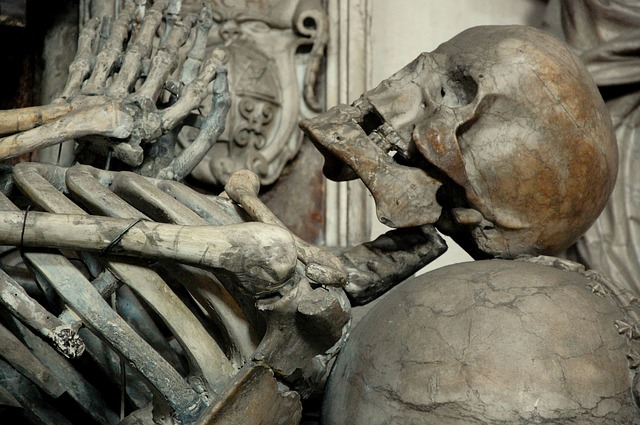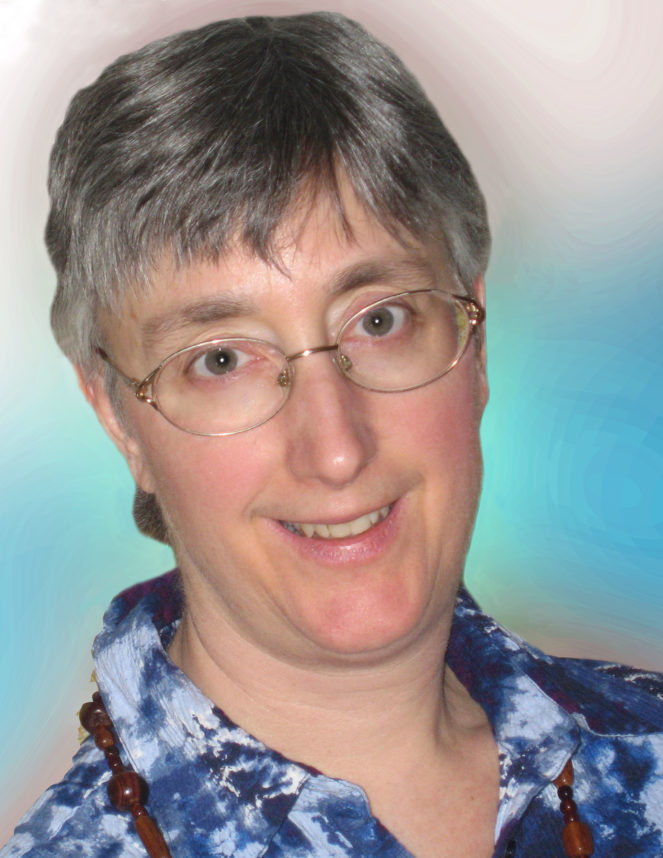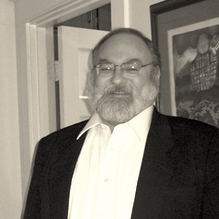 Memnto Mori
Memnto Mori “When I look at even a tiny scrap of paper in all the ‘clutter’ I can’t part with,” my cousin reflected, “the whole memory comes rushing back, completely reconstructed.” I was having a heart-to-heart discussion with her about hoarding and clutter in general. Being a “declutterer” par excellence I wanted to understand more about savers, and possibly more about why I am so “Spartan”( as a saver friend of mine puts it). So when I asked my cousin why it was so hard even to part with what she admitted were “no longer necessary things like the three extra coats my mother had and which are just sitting there in the closet,” she gave me a moving answer: “If I throw something out, I am so afraid I will lose the memory.”
I think my cousin would highly appreciate what some wise aliens had to say to a human visitor who could not fathom why memories of a pleasant event are “just as good” as the event itself. In Out of the Silent Planet by C. S. Lewis, the alien patiently explains to the human that memory is not separate from the event remembered:
“A pleasure and the memory are all one thing…What you call remembering is the last part of the pleasure. When you and I first met, the meeting was over very shortly, it was nothing. Now it is growing something as we remember it. But still we know very little about it. What it will be when I remember it as I lie down to die, what it makes in me all my days until then—that is the real meeting. The other is only the beginning of it.”
Now that may be going too far, but so much about Judaism, and perhaps all religions, is about remembering, and by so doing, reenacting the event. The example that comes most readily to mind is Passover, where the principal purpose of the Seder is to relive the story of transitioning from slavery to freedom. Shavuot, which commemorates receiving the Torah, asks us to feel as if on that very day of the holiday we were receiving and hearing the words of the Torah for the very first time, re-experiencing its revelation to us. Even the Sabbath is about recalling the opening moments of Creation and the refreshing break that God took after all that work, which goes for us too at the end of each week. That is a lot of remembering!
When we lose someone, they die. But our memories of them can last throughout our own lifetime. True, they are a distant remove from the “real thing”, but we cling onto whatever we can. Maybe that is why we do whatever it takes to make these memories as enduring as possible. As Jews, we do not want to “forget” the pivotal events that make up our identity and understanding of who we are such as becoming a free and distinct people and receiving the Torah. As individuals, we want to remember our loved ones through letters (I can’t seem to bring myself to say “emails”), photos, videos, conversations with others who knew them, and through things they owned such as jewelry, awards, or things they created. Yes, things can add up and become clutter. And yes, saving too little can imperil those cherished memories, causing a secondary death.
But whether you are a “saver” or a “declutterer,” there is another even more enduring way to keep them alive. Bear in mind the Hebrew expression, “Zichrono/a l’bracha,” used in referring to someone who has recently died. Literally this means, “Remember him/her for blessing.” Setting aside the exact technicalities of this phrase, to many Jews, this suggests that whatever mitzvot we perform as a result of the influence of our loved ones perpetuates their legacy. Just as whenever we read Torah we can ponder what is being revealed to us at that moment, when we carry out the good deeds that our loved one has done and has modeled for us to do, these bring our loved one to life anew.
Rabbi and board certified Chaplain Karen B. Kaplan is author of Encountering the Edge: What People Told Me Before They Died (Pen-L Publishing, 2014) a series of true anecdotes capped with the deeper reasons she chose her vocation. She has also recently published a collection of science fiction stories, Curiosity Seekers (Createspace Independent Publishing, 2017). She has submitted multiple entries published in Expired And Inspired.

___________
Gamliel Café
Gamliel Students are invited to an informal online monthly session, held monthly. On the third THURSDAY of each month, different person(s) will offer a short teaching or share some thoughts on a topic of interest to them, and those who are online will have a chance to respond, share their own stories and information, and build our Gamliel Institute community connections. This initiative is being headed up by Rena Boroditsky and Rick Light. You should receive email reminders monthly. The next scheduled session of the Gamliel Café is April 19th.
If you are interested in teaching a session, you can contact us at rboroditsky@jewisgh-funerals.org, rlight@jewish-funerals.org, or info@jewish-funerals.org.
____________________
Taste of Gamliel Series
Register now for our 2018 series, Your’re Gonna Miss Me When I’m Gone: Jewish Practices of Remembrance. The series features Rabbi Stuart Kelman, Rabbi SaraLeya Schley, Maharat Victoria Sutton, Rabbi Yonatan Cohen, and Jacob Klein of Keshet. They will be discussing topics such as Sephardic Customs, Understanding the Mourners Kaddish, an Alternative Yizkor Service, Disenfranchised Grief, and Trans Day of Remembrance, all relating to remembrance and memory.
The series began Sunday evening, February 4, and will continue on Sunday evenings, generally one session per month, at 8 PM Eastern time and 5 PM Pacific time. Each session runs approximately 90 minutes. Upcoming sessions are:
April 8: Jewish Trans Day of Remembrance – Jacob Klein
April 29: Disengranchised Grief – Rabbi Yonatan Cohen
May 27: An Alternative Yizkor Service – Rabbi SaraLeya Schley
If you cannot attend a session, no worries! They are recorded and made available to those registered.
Registration for Taste of Gamliel is mandatory to access the sessions. The sessions are free, but there is a suggested minimum donation of $36 for the entire series.
Those registered will be sent the information on how to connect to the sessions. To register, click here: register.
_______________
Gamliel Institute Course 1
Chevrah Kadisha: History, Origins, & Evolution
This course will begin April 10th and run for 12 weeks. There is an orientation session on April 3rd. Register now at https://www.jewish-funerals.org/gamreg. If you want to know how the Chevrah Kadisha developed and why we do what we do today, this is for you!
_______________
Gamliel Continuing Education Courses
Gamliel students should be on the lookout for information on a series of Gamliel Continuing Education Courses, advanced sessions focusing in on different topics. These will be in groups of three sessions each quarter (three consecutive weeks), with different topics addressed in each series. The goal is to look at these topics in more depth than possible during the core courses. The first course took place in Fall 2017, focusing on Psalms.
The next course will be April 25, May 2nd and May 9th, and will look at death as seen in the Zohar, taught by Beth Huppin.
Registration is required, and there will be a tuition charge of $72 for the three sessions. Contact us for information, by email info@jewish-funerals.org, or call 410-733-3700, or simply register online at www.jewish-funerals.org/gamreg/.
_____________________
16th annual Kavod v’Nichum Chevrah Kadisha and Jewish Cemetery Conference and Gamliel Day of Learning
Mark your calendar and hold the dates! June 3-5, 2018, in the Washington D.C. area.
Click here to register
Location – The conference will be at Congregation Beth El in Bethesda, Maryland (just north of Washington, DC)
Dates and Times – The main part of the conference will be from noon on Sunday June 3 to 1pm on Tuesday June 5, 2018. There will be tours and hands-on workshops on Sunday morning.
The Gamliel Day of Learning will be from Tuesday at 2pm through Wednesday at noon. You will not want to miss this – we have arranged for Erica Brown to teach at this event on Tuesday – this day of learning is going to be fantastic!
Who Should Attend? Consider attending the conference if you:
- are interested in the fields of community organizing, consumer advocacy, bikkur cholim, chaplaincy,rabbinic texts, thanatology, hospice care, grief therapy, funeral direction, cemetery management, and legacy planning
- recognize the importance of liturgy and ritual in ensuring that the spiritual dimension of the end-of-life continuum is appreciated, and that the work of the Chevrah Kadisha is done with full regard for the respect and dignity of all involved
- want to learn more about the entire end-of-life continuum – dealing with life-threatening illness, legacy and preparation of ethical wills, preparing for death and at the time of death, care for the body- taharahand shmirah, care for relatives and friends, funeral and burial, mourning, grieving, remembering and providing comfort – with underlying themes of communal obligation, care for the poor and elderly, consumer protection, and Jewish continuity.
- believe it is essential to shift the culture surrounding continuum-of-life issues in the Jewish community – from an attitude of denial and neglect around death, to a more open attitude towards death that includes increasing awareness, acceptance, and healthy integration into family and community life.
- want to participate in the development of a strong Jewish corps of professionals and volunteers to become communal leaders who work to inspire, support, organize, teach, and advocate for the full range of Chevrah Kadisha work in synagogues and communities.
Workshop Leaders – If you are interested, or know someone else who might be interested in leading a workshop, suggest it to us with a short paragraph of explanation – send to info@Jewish-funerals.org
Registration – Registration is open now.
Organization Pricing – is available if three or more members of an organization are attending the whole conference and the organization has paid membership dues of $180. You can cover the cost of organizational membership right on the registration form. Even if you don’t have three members attending the conference, we appreciate your organization’s support as a member.
Books – This year you can pre-order and pre-pay for books right on the registration form.
Exhibits – If you, or someone you know, would like to exhibit at the conference, let us know by sending us an email – info@Jewish-funerals.org
Meals – In addition to Sunday brunch, we provide six supervised Kosher meals as part of the conference registration. Please let us know if you have allergies or special dietary needs.
Flights – Many cities have direct flights to National (DCA), Baltimore Washington (BWI) and Dulles (IAD).
Ground Transport – Direct connections to the Metro are available from National Airport. We’ll update the website mid-January with additional ground transportation options.
Hotel – We have negotiated a great hotel rate at American Inn. Contact them at 301-656-9300 and give them group booking code KNG or email or phone our hotel contact Minoli, Minoli.Muhandiramge@baywoodhotels.com who is at extension 111. Our group rate is $139 plus 13% tax per room per night for singles or doubles. There are a limited number of doubles.
Home Hospitality – will be available. Let us know if you are interested.
Shabbat – If you would like to be connected to a family for Shabbat dinner, home hospitality, and synagogue services, let us know.
Refunds: 90% of the registration fee will be refunded if you cancel in writing before May 1; 80% before May 15; 50% May 15 or later, only if you have a really good excuse!
_____________________
DONATIONS
Donations are always needed and most welcome to support the work of Kavod v’Nichum and the Gamliel Institute, helping us to bring you the annual conference, offer community trainings, provide scholarships to students, refurbish and update course materials, expand our teaching, support programs such as Taste of Gamliel, the Gamliel Café, and the Gamliel Continuing Education courses, provide and add to online resources, encourage and support communities in establishing, training, and improving their Chevrah Kadisha, and assist with many other programs and activities.
You can donate online at http://jewish-funerals.org/gamliel-institute-financial-support or by snail mail to: either Kavod v’Nichum, or to The Gamliel Institute, both c/o David Zinner, Executive Director, Kavod v’Nichum, 8112 Sea Water Path, Columbia, MD 21045. Kavod v’Nichum [and the Gamliel Institute] is a recognized and registered 501(c)(3) organization, and donations may be tax-deductible to the full extent provided by law. Call 410-733-3700 if you have any questions or want to know more about supporting Kavod v’Nichum or the Gamliel Institute.
You can also become a member (Individual or Group) of Kavod v’Nichum to help support our work. Click here (http://www.jewish-funerals.org/money/).
___________
MORE INFORMATION
If you would like to receive the periodic Kavod v’Nichum Newsletter by email, or be added to the Kavod v’Nichum Chevrah Kadisha & Jewish Cemetery email discussion list, please be in touch and let us know at info@jewish-funerals.org.
You can also be sent a regular email link to the Expired And Inspired blog by sending a message requesting to be added to the distribution list to j.blair@jewish-funerals.org.
Be sure to check out the Kavod V’Nichum website at www.jewish-funerals.org, and for information on the Gamliel Institute, courses planned, and student work in this field also visit the Gamliel.Institute website.
RECEIVE NOTICES WHEN THIS BLOG IS UPDATED and When Other Relevant Items are published!
Sign up on our Facebook Group page: just search for and LIKE Chevra Kadisha sponsored by Kavod vNichum, or follow our Twitter feed @chevra_kadisha.
____________________
SUBMISSIONS WELCOME
If you have an idea for an entry you would like to submit to this blog, please be in touch. Email J.blair@jewish-funerals.org. We are always interested in original unpublished materials that would be of interest to our readers, relating to the broad topics surrounding the continuum of Jewish preparation, planning, rituals, rites, customs, practices, activities, and celebrations approaching the end of life, at the time of death, during the funeral, in the grief and mourning process, and in comforting those dying and those mourning, as well as the actions and work of those who address those needs, including those serving in Bikkur Cholim, Caring Committees, the Chevrah Kadisha, as Shomrim, funeral providers, in funeral homes and mortuaries, and operators and maintainers of cemeteries.
________________________________























 More news and opinions than at a Shabbat dinner, right in your inbox.
More news and opinions than at a Shabbat dinner, right in your inbox.